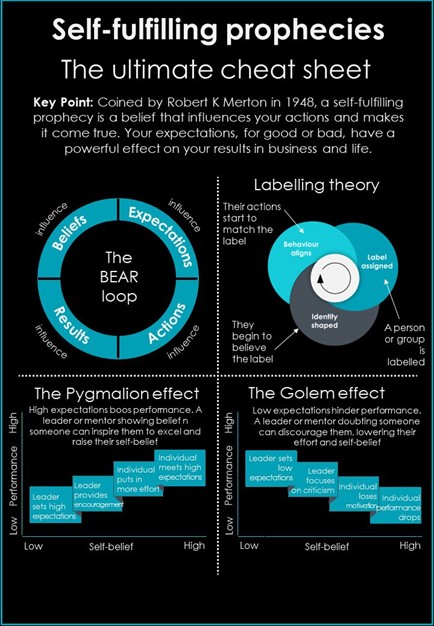
A fellow member of the Harvard Business Review Group, Sean Spurgin, contributed this week some thoughts on self-fulfilling prophesies. His infographic is shown here.
“ Most parents are aware that teachers’ expectations about individual children become self-fulfilling prophecies: If a teacher believes a child is bad at maths, the child will come to believe that too. The lucky child who strikes a teacher as bright also picks up on that expectation and will rise to fulfil it.
“Self-fulfilling prophecies, it turns out, are just as prevalent in our workplaces as they are in classrooms. If a leader is convinced that the people in their group are top performers, they’ll reliably outperform a group whose manager believes the reverse—even if the innate talent of the two groups is similar (HBR). A leader’s beliefs and expectations can significantly impact the way individuals perform.
“The Pygmalion Effect, named after the Greek myth of Pygmalion, highlights how higher expectations lead to improved performance. When leaders hold positive beliefs about their team members’ capabilities, those individuals are more likely to fulfil those expectations.
“Conversely, low expectations can inadvertently hinder performance, reinforcing the notion that beliefs can manifest into reality. Contrary to the Pygmalion effect, the Golem Effect explains how negative expectations can diminish performance.
When leaders harbour doubts or negative perceptions about their team members’ abilities, it creates a self-fulfilling prophecy where individuals underperform in alignment with those expectations. The Golem Effect underscores the detrimental impact of pessimistic beliefs on individual and team success.”
It caused me to reflect on how there are “leaders” of some of our communities who only ever refer to “their” people in degrading terms: they are poor, likely to be imprisoned, colonised, etc. I deliberately put the term “leader” between inverted commas because this is not al all leadership. It is a special sort of cruelty that removes aspiration, hope and potential from a person, or group of people, by continually misinforming them of the possibility in their lives and stripping them of self-belief.
At school I had more than one teacher who insisted we read biographies of successful people. As early as standard 3 I can remember being taught about some of Edmund Hillary’s efforts and what he had to do to achieve. We have many other kiwi role models we can learn from: Ernest Rutherford, Kate Sheppard, Jean Batten, Peter Jackson, Apirana Ngata are a few historical figures that come to mind and there are many living persons who demonstrate values of self-reliance, motivation, and achievement regardless of perceived roadblocks in their way.
I fear that the Golem Effect is much too prevalent in some of our political leaders. I rather hope that I live by a more optimistic attitude: that we in New Zealand can be creative, innovative, aspirational and hopeful. My hope is that the youth of today are not being stripped of that hope.
